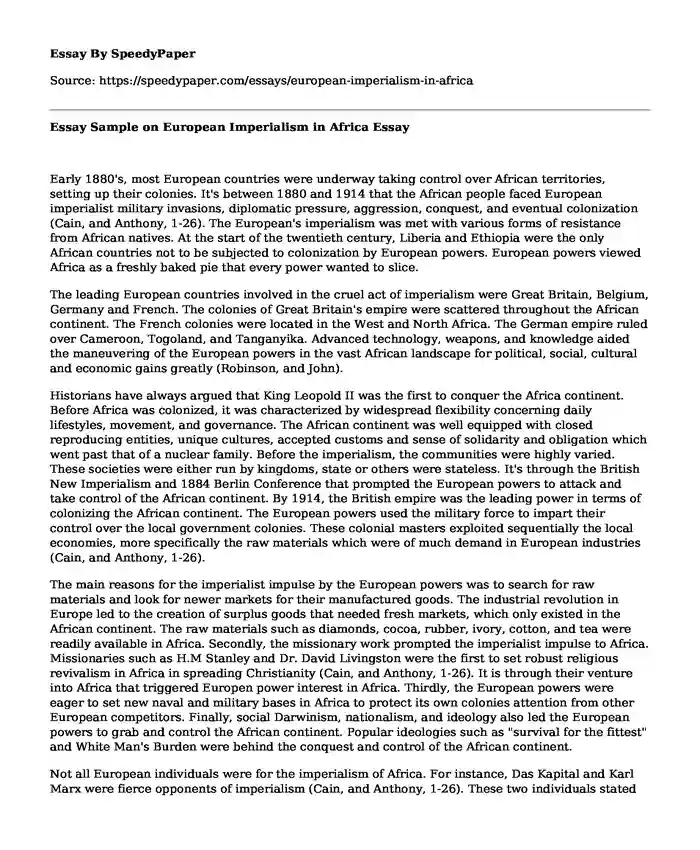Early 1880's, most European countries were underway taking control over African territories, setting up their colonies. It's between 1880 and 1914 that the African people faced European imperialist military invasions, diplomatic pressure, aggression, conquest, and eventual colonization (Cain, and Anthony, 1-26). The European's imperialism was met with various forms of resistance from African natives. At the start of the twentieth century, Liberia and Ethiopia were the only African countries not to be subjected to colonization by European powers. European powers viewed Africa as a freshly baked pie that every power wanted to slice.
The leading European countries involved in the cruel act of imperialism were Great Britain, Belgium, Germany and French. The colonies of Great Britain's empire were scattered throughout the African continent. The French colonies were located in the West and North Africa. The German empire ruled over Cameroon, Togoland, and Tanganyika. Advanced technology, weapons, and knowledge aided the maneuvering of the European powers in the vast African landscape for political, social, cultural and economic gains greatly (Robinson, and John).
Historians have always argued that King Leopold II was the first to conquer the Africa continent. Before Africa was colonized, it was characterized by widespread flexibility concerning daily lifestyles, movement, and governance. The African continent was well equipped with closed reproducing entities, unique cultures, accepted customs and sense of solidarity and obligation which went past that of a nuclear family. Before the imperialism, the communities were highly varied. These societies were either run by kingdoms, state or others were stateless. It's through the British New Imperialism and 1884 Berlin Conference that prompted the European powers to attack and take control of the African continent. By 1914, the British empire was the leading power in terms of colonizing the African continent. The European powers used the military force to impart their control over the local government colonies. These colonial masters exploited sequentially the local economies, more specifically the raw materials which were of much demand in European industries (Cain, and Anthony, 1-26).
The main reasons for the imperialist impulse by the European powers was to search for raw materials and look for newer markets for their manufactured goods. The industrial revolution in Europe led to the creation of surplus goods that needed fresh markets, which only existed in the African continent. The raw materials such as diamonds, cocoa, rubber, ivory, cotton, and tea were readily available in Africa. Secondly, the missionary work prompted the imperialist impulse to Africa. Missionaries such as H.M Stanley and Dr. David Livingston were the first to set robust religious revivalism in Africa in spreading Christianity (Cain, and Anthony, 1-26). It is through their venture into Africa that triggered Europen power interest in Africa. Thirdly, the European powers were eager to set new naval and military bases in Africa to protect its own colonies attention from other European competitors. Finally, social Darwinism, nationalism, and ideology also led the European powers to grab and control the African continent. Popular ideologies such as "survival for the fittest" and White Man's Burden were behind the conquest and control of the African continent.
Not all European individuals were for the imperialism of Africa. For instance, Das Kapital and Karl Marx were fierce opponents of imperialism (Cain, and Anthony, 1-26). These two individuals stated that the bourgeoisie required a constant expansion of markets for higher profits will lead to the conquest, and thus such ambition of market expansion should be altered. Others, such as Hobson, who were anti-imperialism stated that imperialist powers could be forced to create colonies that would provide raw materials and new markets for the European manufactured goods which in return will influence the stability of African culture, widespread flexibility about daily lifestyles, movement, and governance.
Work Cited
Cain, Peter J., and Anthony G. Hopkins. "Gentlemanly Capitalism and British expansion overseas II: new imperialism, 18501945." The Economic History Review 40.1 (1987): 1-26.
Robinson, Ronald Edward, and John Gallagher. Africa and the Victorians: The official mind of imperialism. Vol. 131. Macmillan, 1966.
Cite this page
Essay Sample on European Imperialism in Africa. (2022, Dec 01). Retrieved from https://speedypaper.net/essays/european-imperialism-in-africa
Request Removal
If you are the original author of this essay and no longer wish to have it published on the SpeedyPaper website, please click below to request its removal:
- Analysis of Salvation by Langston Hughes - Essay Example
- Essay Sample on Family Resource Management Issue
- Essay Sample about Internet Marketing Plan for the Tournament
- Essay Sample for Students: Gender Discrimination at the Workplace
- Free Paper Sample: Expansion of my Colleague's Explanation of Journal Article A
- Leadership Development Program - Free Essay Sample
- Free Essay. Women Abuse During the 19th Century in "Oliver Twist" and "Hard Times."
Popular categories





